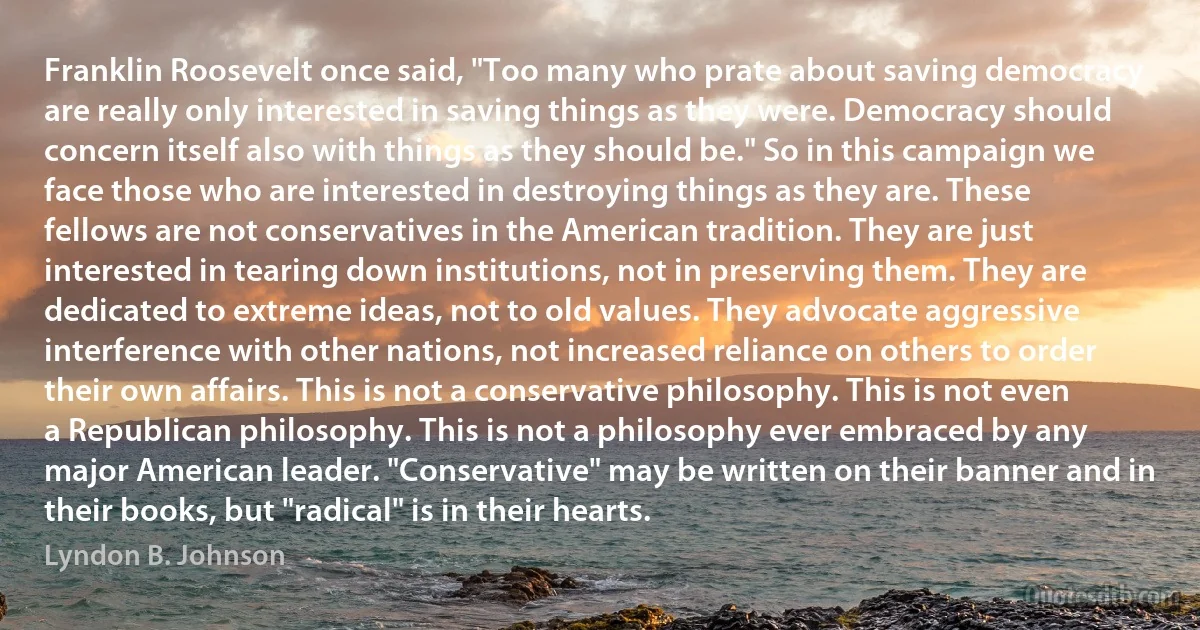
Franklin Roosevelt once said, "Too many who prate about saving democracy are really only interested in saving things as they were. Democracy should concern itself also with things as they should be." So in this campaign we face those who are interested in destroying things as they are. These fellows are not conservatives in the American tradition. They are just interested in tearing down institutions, not in preserving them. They are dedicated to extreme ideas, not to old values. They advocate aggressive interference with other nations, not increased reliance on others to order their own affairs. This is not a conservative philosophy. This is not even a Republican philosophy. This is not a philosophy ever embraced by any major American leader. "Conservative" may be written on their banner and in their books, but "radical" is in their hearts.
Lyndon B. JohnsonRelated topics
campaign face franklin interference leader once order republican say should tearing write affairs others roosevelt things heartsRelated quotes
We must first of all, however, definitely understand, in reference to the end we have in view, that it is not the concern of philosophy to produce religion in any individual. Its existence is, on the contrary, presupposed as forming what is fundamental in every one. So far as man s essential nature is concerned, nothing new is to be introduced into him. To try to do this would be as absurd as to give a dog printed writings to chew, under the idea that in this way you could put mind into it. It may happen that religion is awakened in the heart by means of philosophical knowledge, but it is not necessarily so. It is not the purpose of philosophy to edify, and quite as little is it necessary for it to make good its claims by showing in any particular case that it must produce religious feeling in the individual.

Georg Wilhelm Friedrich Hegel
The American two-party electoral system, with its ballyhoo and hoopla, its impresarios and stunt artists, is the greatest show on earth. Campaign time is show time, a veritable circus brought into our living rooms via television as a form of entertainment. The important thing is that the show must go on - because it is more than just a show. The two-party system electoral social order. It channels and limits political expression, and blunts class grievances. It often leaves little time for the real issues because it gives so much attention to the contest per se who will run? who is ahead? who will win the primaries? who will win the election? It provides the form of republican government with little of the substance. It fives the plutocratic system of appearance of popular participation while being run by and for a select handful of affluent contestants.

Michael Parenti
Economists, like everyone, have their political biases, but these are by no means as strong an influence on what they are willing to consider as you might think. For example, one might have thought that strongly liberal economists like, say, James Tobin would be at least mildly sympathetic to the views of radical economists who draw their inspiration from Marx, or of heterodox economic thinkers like Galbraith. After all, in such fields as history and sociology the Marxist or post-Marxist left has long received a respectful hearing. And yet you don't find this happening: liberal economists are almost as quick as their conservative colleagues to condemn heterodox leftist ideas as foolish it was the liberal Robert Solow, not Milton Friedman, who defended orthodoxy in the bitter "capital controversy" with British radicals.

Paul Krugman
For what advantage is it, that the world enjoys profound peace, if thou art at war with thyself? This then is the peace we should keep. If we have it, nothing from without will be able to harm us. And to this end the public peace contributes no little: whence it is said, ‘That we may lead a quiet and peaceable life.' But if any one is disturbed when there is quiet, he is a miserable creature. Seest thou that He speaks of this peace which I call the third (inner, ed.) kind? Therefore when he has said, ‘that we may lead a quiet and peaceable life,' he does not stop there, but adds ‘in all godliness and honesty.' But we cannot live in godliness and honesty, unless that peace be established. For when curious reasonings disturb our faith, what peace is there? or when spirits of uncleanness, what peace is there?

John Chrysostom
These are pregnant statements; they avow a sentiment, a political principle of action, a sentiment of hatred to slavery as extreme as hatred can exist. The political principle here avowed is, that his action against slavery is not to be restrained by the Constitution of the United States, as interpreted by the Supreme Court of the United States. I say, if you can find any degree of hatred greater than that, I should like to see it. This is the sentiment of the chosen leader of the Black Republican party; and can you doubt that it is not entertained by every solitary member of that same party? You cannot, I think. He is a representative man; his sentiments are the sentiments of his party; his principles of political action are the principles of political action of his party. I say, then; it is true, at least, that the Republican party of the North hates slavery.

Henry L. Benning
